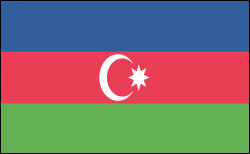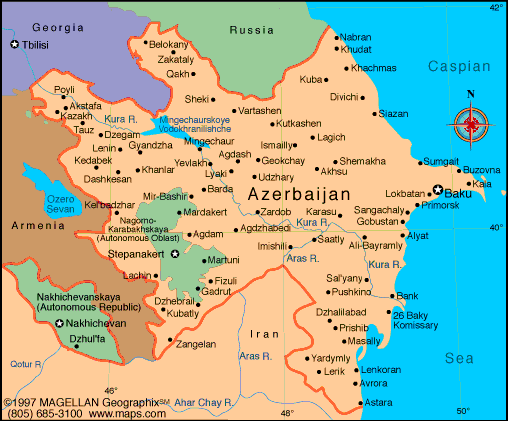AZERBAIJAN

Geography: Azerbaijan is located on the western shore of the Caspian Sea at the southeast extremity of the Caucasus. The region is a mountainous country, and only about 7% of it is arable land. The Kura River Valley is the area's major agricultural zone.
Government: Constitutional republic.
History: Northern Azerbaijan was known as Caucasian Albania in ancient times. The area was the site of many conflicts involving Arabs, Kazars, and Turks. After the 11th century, the territory became dominated by Turks and eventually was a stronghold of the Shiite Muslim religion and Islamic culture. The territory of Soviet Azerbaijan was acquired by Russia from Persia through the Treaty of Gulistan in 1813 and the Treaty of Turkamanchai in 1828.
After the Bolshevik Revolution, Azerbaijan declared its independence from Russia in May 1918. The republic was reconquered by the Red Army in 1920 and was annexed into the Transcaucasian Soviet Socialist Republic in 1922. It was later reestablished as a separate Soviet Republic on Dec. 5, 1936. Azerbaijan declared independence from the collapsing Soviet Union on Aug. 30, 1991.
Since 1988, Azerbaijan and Armenia have been feuding over the enclave of Nagorno-Karabakh. The majority of the enclave's inhabitants are Armenian Christians agitating to secede from the predominantly Muslim Azerbaijan and join with Armenia. War broke out in 1988 when Nagorno-Karabakh tried to break away and annex itself to Armenia, and 30,000 died before a cease-fire agreement was reached in 1994, with Armenia regaining its hold over the disputed enclave. Final plans on the status of Nagorno-Karabakh have yet to be determined.
History: Northern Azerbaijan was known as Caucasian Albania in ancient times. The area was the site of many conflicts involving Arabs, Kazars, and Turks. After the 11th century, the territory became dominated by Turks and eventually was a stronghold of the Shiite Muslim religion and Islamic culture. The territory of Soviet Azerbaijan was acquired by Russia from Persia through the Treaty of Gulistan in 1813 and the Treaty of Turkamanchai in 1828.
After the Bolshevik Revolution, Azerbaijan declared its independence from Russia in May 1918. The republic was reconquered by the Red Army in 1920 and was annexed into the Transcaucasian Soviet Socialist Republic in 1922. It was later reestablished as a separate Soviet Republic on Dec. 5, 1936. Azerbaijan declared independence from the collapsing Soviet Union on Aug. 30, 1991.
Since 1988, Azerbaijan and Armenia have been feuding over the enclave of Nagorno-Karabakh. The majority of the enclave's inhabitants are Armenian Christians agitating to secede from the predominantly Muslim Azerbaijan and join with Armenia. War broke out in 1988 when Nagorno-Karabakh tried to break away and annex itself to Armenia, and 30,000 died before a cease-fire agreement was reached in 1994, with Armenia regaining its hold over the disputed enclave. Final plans on the status of Nagorno-Karabakh have yet to be determined.

Map of
Azerbaijan
Republic of Azerbaijan
President: Ilham Aliyev (2003)
Prime Minister: Artur Rasizade
(2003)
Land area: 33,436 sq mi (86,600 sq km);
total area: 33,436 sq mi (86,600 sq km)
Population (2014 est.): 9,686,210
(growth rate: 0.99%); birth rate: 16.96/1000; infant mortality rate:
26.67/1000; life expectancy: 71.91
Capital and largest city (2011 est.):
Baku, 2.123 million
Other large cities (2004 est.):
Ganja, 303,000; Sumgait, 280,500
Monetary unit: Manat
National Name: Azarbaycan
Respublikasi
Languages:
Azerbaijani (Azeri) (official) 92.5%, Russian 1.4%, Armenian 1.4%, other 4.7% (2009 est.)
Religions:
Muslim 93.4%, Russian Orthodox 2.5%, Armenian Orthodox
2.3%, other 1.8% (1995 est.). Note: religious affiliation is still
nominal in Azerbaijan; percentages for actual practicing adherents are
much lower
National Holiday:
Founding of the Democratic Republic of
Azerbaijan, May 28
Literacy rate: 99.8% (2010 est.)
Economic summary: GDP/PPP (2013
est.): $102.7 billion; per capita $10,800. Real growth rate:
5.8%. Inflation: 2.4%. Unemployment: 6% official rate
(2013 est.). Arable land: 21.78%. Agriculture: cotton,
grain, rice, grapes, fruit, vegetables, tea, tobacco; cattle, pigs,
sheep, goats. Labor force: 4.68 million (2012 est.);
agriculture and forestry 38.3%, industry 12.1%, services 49.6% (2008).
Industries: petroleum and natural gas, petroleum products,
oilfield equipment; steel, iron ore; cement; chemicals and
petrochemicals; textiles. Natural resources: petroleum,
natural gas, iron ore, nonferrous metals, alumina. Exports:
$34.46 billion (2013 est.): oil and gas 90%, machinery,
cotton, foodstuffs. Imports: $10.72 billion (2013
est.): machinery and equipment, oil products, foodstuffs, metals,
chemicals. Major trading partners: Italy, Israel, Turkey,
France, U.S., India, Russia, China, Germany, Indonesia, Ukraine, Thailand, UK (2006).
Communications: Telephones: main lines
in use: 1.734 million (2012); mobile cellular: 10.125 million (2012).
Broadcast media: 3 state-run and 1 public TV
channels; 4 domestic commercial TV stations and about 15 regional TV
stations; cable TV services are available in Baku; 1 state-run and 1
public radio network operating; a small number of private commercial
radio stations broadcasting; local FM relays of Baku commercial stations
are available in many localities; local relays of several international
broadcasters had been available until late 2008 when their broadcasts
were banned from FM frequencies (2010). Internet
hosts: 46,856 (2011). Internet users: 2.42 million (2009).
Transportation: Railways: total: 2,918
km (2011). Highways: total: 59,141 km ; paved: 29,210 km;
unpaved: 29,931 km (2011). Ports and harbors: Baku (Baki).
Airports: 37 (2013).
International disputes:Azerbaijan,
Kazakhstan, and Russia ratified the Caspian seabed delimitation
treaties based on equidistance, while Iran continues to insist on a
one-fifth slice of the sea; the dispute over the break-away
Nagorno-Karabakh region and the Armenian military occupation of
surrounding lands in Azerbaijan remains the primary focus of regional
instability; residents have evacuated the former Soviet-era small ethnic
enclaves in Armenia and Azerbaijan; local border forces struggle to
control the illegal transit of goods and people across the porous,
undemarcated Armenian, Azerbaijani, and Georgian borders; bilateral
talks continue with Turkmenistan on dividing the seabed and contested
oilfields in the middle of the Caspian.
-------------------- o --------------------
No comments:
Post a Comment